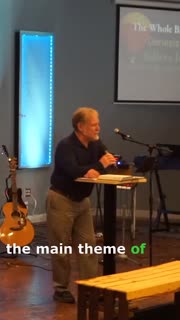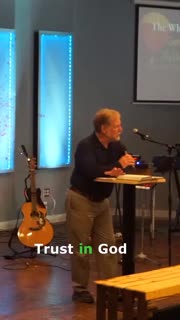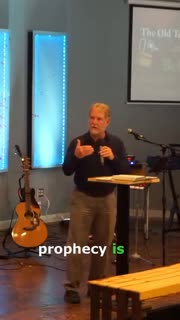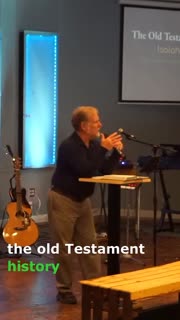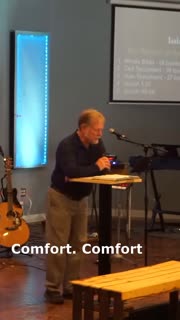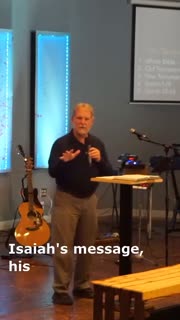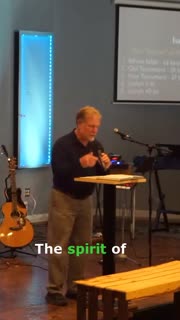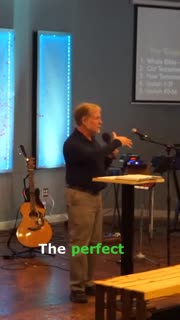Trusting God: The Central Message of the Bible
Devotional
Sermon Summary
Bible Study Guide
Sermon Clips
### Quotes for Outreach
1. "The main theme of the Bible, no matter which page you flip open, does not matter from the very first page to the very last page, the message is believe in God. That's the big idea. Turn your heart. You have enough faith. We usually just kind of scatter it around to a whole bunch of different options instead of putting it all on one marker. And God says take all that expectation, that dream, that belief, that hope that you have and realize that God is in your corner or you're in his. And he is going to bring about what is right, what is whole, what is redemptive, what is solid in your life." (45 seconds)
2. "Trust in God and obey according to his word. And ultimately, that combination of trust and obey, there's an old hymn about that, that has to do with the two sides. God has his part, we have our part, which is to put our faith in God and to walk according." (17 seconds)
3. "Prophecy is the clear declaration of the will and heart and plan of God. And then that becomes our opportunity to respond or deny, to listen or to turn our backs. That's what's going on the prophetic message." (16 seconds)
4. "The old Testament history is believe in God and obey according to his word. And they go, yeah, that was the problem. That's the whole story of the old Testament. They didn't, they just didn't pull it together and actually function the way God wanted them to do." (15 seconds)
5. "Comfort. Comfort my people. Says your God. Speak tenderly to Jerusalem and to proclaim to her that her hard service has been completed. Her sin has been paid for. She has received from the Lord's hand double for all her sins. A voice of one calling in the wilderness prepare the way for the Lord. Make straight in the desert a highway for our God." (26 seconds)
### Quotes for Members
1. "The challenge often is we develop expectations that are not fulfilled and that's incredibly frustrating beyond imagination. Trust in God and obey according to his word. And ultimately, that combination of trust and obey, there's an old hymn about that, that has to do with the two sides. God has his part, we have our part, which is to put our faith in God and to walk according." (17 seconds)
2. "The nature of the prophets, there are two kinds of prophets in the old Testament, new Testament as well. There are those who acted out or spoke their message. And there are those that wrote their message. So we're looking at the writing prophets, but even interspersed through all of this, there are speaking prophets and acting prophets as well. So we'll be looking at the prophetic word." (16 seconds)
3. "Isaiah's message, his overview has to do with, I'm warning you, I'm telling you, change your life, change your culture, change the way you treat yourselves and the world. And if you do, this is what's going to happen if you don't. But even if you don't, I'm still going to act to redeem you. I am still going to bring you blessing. That's the nature of God. That's the generosity and the grace that comes through the book of Isaiah." (30 seconds)
4. "The spirit of the sovereign Lord is on me, because the Lord has anointed me to proclaim good news to the poor. He has sent me to bind up the brokenhearted and to proclaim freedom for the captives, release from darkness for the prisoners, and proclaim the year of the Lord's favor. And Jesus stopped abruptly right there. But the verse goes on. And the day of vengeance of our God, to comfort all who mourn and to provide for those who grieve in Zion, to bestow on them a crown of beauty instead of ashes, the oil of joy instead of mourning, a garment of praise, praise instead of a spirit of despair." (40 seconds)
5. "The perfect description of the role of Jesus, not the mechanics, not the offerings, not the temple, not the priesthood, not the kings, not all the fancy leaders, not even their history and Moses and all that stuff. He is going to do it." (15 seconds)
Ask a question about this sermon
1. "The main theme of the Bible, no matter which page you flip open, does not matter from the very first page to the very last page, the message is believe in God. That's the big idea. Turn your heart. You have enough faith. We usually just kind of scatter it around to a whole bunch of different options instead of putting it all on one marker. And God says take all that expectation, that dream, that belief, that hope that you have and realize that God is in your corner or you're in his. And he is going to bring about what is right, what is whole, what is redemptive, what is solid in your life." (45 seconds)
2. "Trust in God and obey according to his word. And ultimately, that combination of trust and obey, there's an old hymn about that, that has to do with the two sides. God has his part, we have our part, which is to put our faith in God and to walk according." (17 seconds)
3. "Prophecy is the clear declaration of the will and heart and plan of God. And then that becomes our opportunity to respond or deny, to listen or to turn our backs. That's what's going on the prophetic message." (16 seconds)
4. "The old Testament history is believe in God and obey according to his word. And they go, yeah, that was the problem. That's the whole story of the old Testament. They didn't, they just didn't pull it together and actually function the way God wanted them to do." (15 seconds)
5. "Comfort. Comfort my people. Says your God. Speak tenderly to Jerusalem and to proclaim to her that her hard service has been completed. Her sin has been paid for. She has received from the Lord's hand double for all her sins. A voice of one calling in the wilderness prepare the way for the Lord. Make straight in the desert a highway for our God." (26 seconds)
### Quotes for Members
1. "The challenge often is we develop expectations that are not fulfilled and that's incredibly frustrating beyond imagination. Trust in God and obey according to his word. And ultimately, that combination of trust and obey, there's an old hymn about that, that has to do with the two sides. God has his part, we have our part, which is to put our faith in God and to walk according." (17 seconds)
2. "The nature of the prophets, there are two kinds of prophets in the old Testament, new Testament as well. There are those who acted out or spoke their message. And there are those that wrote their message. So we're looking at the writing prophets, but even interspersed through all of this, there are speaking prophets and acting prophets as well. So we'll be looking at the prophetic word." (16 seconds)
3. "Isaiah's message, his overview has to do with, I'm warning you, I'm telling you, change your life, change your culture, change the way you treat yourselves and the world. And if you do, this is what's going to happen if you don't. But even if you don't, I'm still going to act to redeem you. I am still going to bring you blessing. That's the nature of God. That's the generosity and the grace that comes through the book of Isaiah." (30 seconds)
4. "The spirit of the sovereign Lord is on me, because the Lord has anointed me to proclaim good news to the poor. He has sent me to bind up the brokenhearted and to proclaim freedom for the captives, release from darkness for the prisoners, and proclaim the year of the Lord's favor. And Jesus stopped abruptly right there. But the verse goes on. And the day of vengeance of our God, to comfort all who mourn and to provide for those who grieve in Zion, to bestow on them a crown of beauty instead of ashes, the oil of joy instead of mourning, a garment of praise, praise instead of a spirit of despair." (40 seconds)
5. "The perfect description of the role of Jesus, not the mechanics, not the offerings, not the temple, not the priesthood, not the kings, not all the fancy leaders, not even their history and Moses and all that stuff. He is going to do it." (15 seconds)
